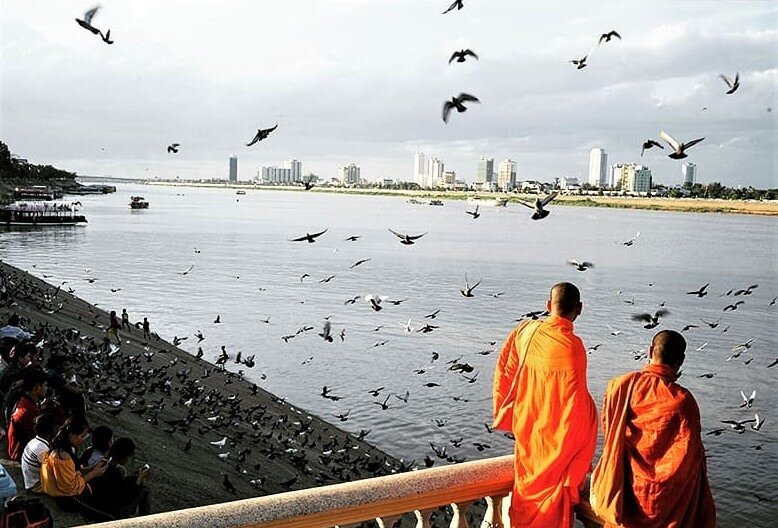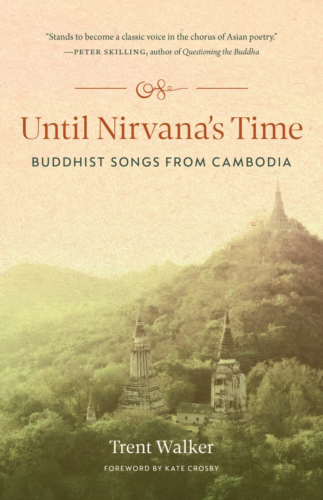A Chant Has Nine Lives: The Circulation of Theravada Liturgies in Thailand, Cambodia, and Vietnam
by Trent Walker
Cultural and geographical variations of the Theravada liturgy, chanting and rituals in Southeast Asia.

Publication: Journal of Vietnamese Studies, Vol. 15-3, pp 36-78 | University of California
Published: 2020
Author: Trent Walker
Pages: 43
Language : English
"While in modern times there is at least a broadly accepted view among Theravadins that the Tipitaka (Pali canon) contains the core monastic rules [vinaya], discourses [sutta], and higher teachings [abhidhamma] as outlined by the Buddha, there is very little in the way of a standard liturgy", remarks the author in his preamble.
"Theravada societies across linguistic, cultural, and national borders tend to share certain Pali canonical materials in their chanting curricula, including the three refuges [tisaraṇa], the five precepts [pañcasīla], various protective discourses [paritta], and fixed monastic rites [kammavācā] such as ordination [pabbajjā/upasampadā] and recitation of the monastic rule [pāṭimokkha]. Beyond these commonalities, however, most of the texts that Theravada Buddhists regularly recite and commit to memory are not directly excerpted from the Tipitaka but from much more recent Pali and vernacular compositions."
Analyzing the Khmer variant of ancestral Pali chants, the author notes: "The Khmer stanzas, by contrast, imply that all living beings are helplessly mired in ignorance. The author of this version memorably expands on the nature of this ignorance: “Completely enveloped in darkness / and crouched over like the blind, / they’re confused and they convulse, / as if strangled by a noose.” These lines, while absent from the Pali and Siamese antecedents, heighten the stakes for the ritual invitation to preach. They also demonstrate how the process of transferring a chant from one Theravada culture to another in Southeast Asia usually results in an expanded text. In this case, the doctrine shifts as well. The Buddha’s mandate is no longer restricted to a select few; he is instead called to teach all beings, even in the frightening depths of their delusion."
Photo: Monks during Phnom Penh Water Festival (by Greg Mo)
Tags: Theravada Buddhism, Khmer religion, Vietnam, Thailand, Pali, translations
About the Author

Trent Walker
Lecturer in religious studies at Stanford University with a PhD in Buddhist - Studies (University of California-Berkeley), Trent Walker is currently Director of Preservation and Lead Scholar of the Khmer Manuscript Heritage Project, Buddhist Digital Resource Center, aimed at digitizing over 10,000 palm-leaf and bark-paper manuscripts from Cambodia in Khmer, Pali, and Thai.
With a solid knowledge in Khmer, Lanna, Lao, Pali, Sanskrit, Siamese languagees, Trent Walker has published numerous essays on Theravada Buddhism and liturgical traditions of Cambodia, Thailand, Vietnam, in particular the adaptations of Tipitaka, the corpus of Pali canon.
In 2022, Trent Walker published Until Nirvana's Time: Buddhist Songs from Cambodia, the first collection of traditional Cambodian Buddhist poetry available in English, original translations of forty-five texts along with extensive notes and essays. "Sung in daily prayers or all-night rituals of healing, mourning, and consecration, these Dharma songs have guided Khmer-speaking communities in Cambodia, Thailand, and Vietnam for generations," he remarked in his book launch announcement. The collection reflects the author's experience when, in 2005, he went to In 2005, Kampong Speu province to study under the Cambodian Dharma song masters Prum Ut and Koet Ran. You can the video presentation here.

